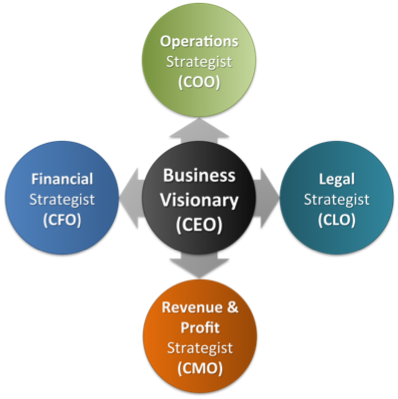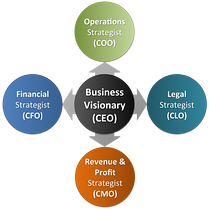CEO Blog - Advice for CEOs on growth and scaling
Four Must-Have Strategists Every CEO Needs


Every CEO has the responsibility to set the vision and make certain the strategies to address this vision are created and implemented. The CEO must determine what resource options are best suited to help develop and implement the various strategies and budget accordingly.
Financial Strategist (CFO)
If the CEO is a finance expert, then developing a finance strategy would be a task that the CEO can address, as long as they have the time and willingness to manage the strategy.
Many CEOs may take on some of the responsibility but virtually all CEOs will bring in a CPA firm to help manage the financial systems needed to run the company including tax issues, cash flow and balance sheet issues, P&L statements and the budgeting process. CEOs may manage the payroll and accounts payable and receivable issues or use an outside agency. Again, CEOs do not hesitate to budget for an outside accounting firm to help develop and manage the finance strategy and its operations. An experienced financial strategist (CFO) provides an essential objective resource to the CEO.
Legal Strategist (CLO)
When developing the legal strategy, the CEO needs to envision numerous legal issues and budget for resources. The type of business will determine the degree of legal assistance needed. If it is a heavily regulated industry with extensive regulatory compliance requirements such as the Medical Device or Banking industry then more legal help will be required. If the CEO happens to be a legal expert then a do-it-yourself resource may be sufficient. However, in these complex legal times lawyers must specialize. Most CEOs will hire a law firm that provides multi specialties or has the ability to manage relationships with associate law firms that provide specialization. Corporate compliance, liability insurance, patents, trademarks, contracts, employment agreements, consulting agreements, lease agreements are among the many issues that a CEO will need to manage. CEOs do not hesitate to budget for the cost of an outside law firm that can help develop and manage the legal strategy. An experienced legal strategist (CLO) provides an essential objective resource to the CEO.
Operational Strategist (COO)
Manufacturing, raw goods, finished goods, shipping receiving, regulatory, assembly, packaging inventory management, are all issues for a company and the strategy to manage depends on the skill set, time and experience of the CEO. Many CEOs will hire a contract manufacturer, a fulfillment house or an outside consultant to help them develop and implement the operational strategy. They do not hesitate to budget for these outside resources. An experienced operational strategist (COO) provides an essential objective resource to the CEO.
Revenue and Profit Strategist (CMO)
With out a doubt this is the most important strategy for the CEO to develop and implement. If there is no revenue and no profit or lagging revenue and insufficient profit then failure will occur and no CEO wants to fail. The CEO has to be the visionary and cheer leader. Who helps the CEO develop and implement the revenue and profit strategy? Is the CEO also the Chief Marketing Officer? In many cases they are and they do not budget sufficient resources to assist in developing and implementing this most important strategy. Instead, the CEO decides on a do-it yourself approach. They may bring in a marketing director or maybe even a marketing support entity to help implement a strategy that may miss the mark. Lagging strategies slow growth and create confusion in the company and the market place. Budgeting for outside assistance in developing a revenue and profit strategy has to be done just as budgeting for legal or accounting strategy must be done.
The business growth expert (CMO) will help the CEO develop and communicate a clear concise vision. The CMO will then make sure strategies are developed and implemented to accomplish the vision. Go-to-market strategies, pricing strategies, acquisition strategies, new market and new product development strategies, competitive threat strategies, distribution strategies are all essential revenue and profit growth strategies that need to be created and managed. These strategies will evolve from an objective SWOT analysis. The chief marketing officer should have this responsibility.
If the CEO is the Chief Marketing officer, do effective and objective strategies evolve? Often they don’t, because many CEOs struggle with preconceptions and bias and the SWOT is self serving and lagging strategies will be developed and implemented. An objective and thorough SWOT is critical to understanding where to take the company.
Experienced CMOs are unbiased in their approach and objective and effective strategies will be developed. Most CEOs are great visionaries, but may struggle when creating best in class strategies and metrics to gauge progress and ROI on the marketing and sales activities that evolve from these strategies. Budgeting for business growth experts is essential to maximize the return on investment, especially the marketing investment. If financial restraints limit the ability to hire an experienced CMO, then a fractional CMO may be an option and should be included in the budget. Just like legal, accounting and operational experts, experienced business growth strategist (CMOs) provide an essential objective resource to the CEO.
Topics: Chief Marketing Officer, Business Leadership and Strategy, CEO Strategies, Business Growth Strategy, CEO Choices, Executive Staffing
Sun, May 8, 2011Related Articles

- Press Releases
- Careers
- Case Studies
- Marketing Consultant Company
- Marketing Strategy Consultants
- Marketing Plan Consultants
- B2B Marketing Consultants
- Virtual CMO
- Marketing Consultant Outsourcing
- Fractional CMO
- What is a Fractional CMO
- Healthcare Marketing Consultant
- Marketing Consultant Houston TX Texas
- Marketing Consultant Texas TX
- Marketing Consultant Bay Area
- CEO Blog
- Ebooks Plus
- Executive Marketing Consultants
- Product Marketing Consultants
- B2C Marketing Consultants
- Virtual Marketing Consultants
- Senior Marketing Consultants
- Temporary CMO
- Hire a CMO
- Fractional CMO Salary
- Fractional CMO Responsibilities
- Marketing Consultant Austin TX Texas
- Marketing Consultant Dallas TX Texas
- Marketing Consultant San Antonio
- Helping Private Equity
- Private Equity Blog
- Leadership Team
- Privacy Policy
- Business Marketing Consultants
- Strategic Marketing Consultants
- Marketing Technology Consultants
- Sales and Marketing Consultants
- CMO Job Description
- CMO Salary
- Fractional CMO Agency
- Fractional CMO Services
- CPG Marketing Consultant
- Marketing Consultant San Diego
- Partners
Houston, TX 77056
© 2023 Chief Outsiders

